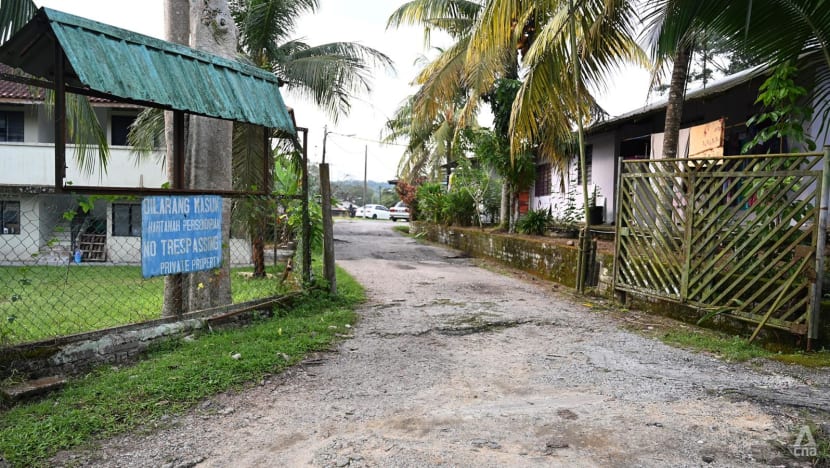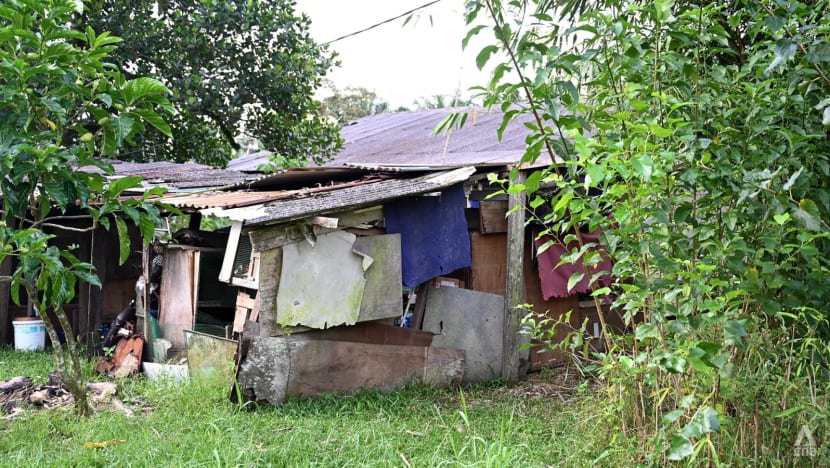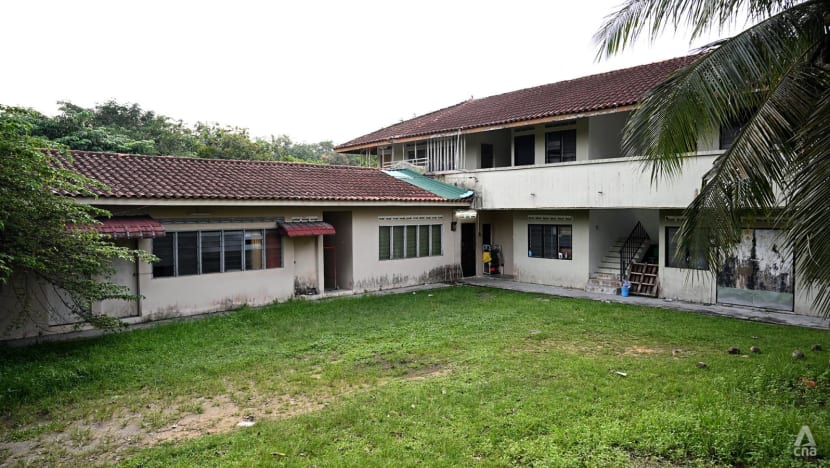Johor police station attack: Suspect’s neighbours say no inkling of his family's suspected JI links
While the attack has raised security fears in Malaysia and even the region, security experts say it is too early to tell if the incident points to a resurgence of a terrorist cell in Johor.

The Luqmanul Hakiem pasentran is located near the main entrance to the village where the suspect who killed two police officers lived. (Photo: CNA/Zamzahuri Abas)

This audio is generated by an AI tool.
ULU TIRAM, Johor: Right at the end of a small village near Johor's Ulu Tiram sits a small, wooden dilapidated house with an uneven zinc roof, housing a family whose neighbours describe as private and even reclusive.
On Friday evening (May 17), local residents were shocked at hearing the family has suspected links to the terrorist organisation Jemaah Islamiyah (JI), after a deadly pre-dawn attack on the town’s police station that killed two cops.
The attacker was a 21-year-old man from the family who Malaysian authorities say was a JI member. He was killed in the firefight. Five family members have been arrested, including his father.
Two others who were making a police report at the time have also been nabbed by the local police who deemed “it was not logical” for them to be reporting an incident which allegedly took place two years ago, implying that they might be involved in the attack as distractions for police.

One woman who wanted to be known only as Rohani told CNA that the family who was arrested was reserved and kept to themselves.
“We just see them when they enter and exit, because they live deep inside the village. We have never spoken to them before. There were no signs they were extremists or terrorists," she said. Rohani was wearing a niqab, a hijab which covers all of the face except the eyes.
A woman who declined to be identified told CNA she had lived in the village for 13 years but had never spoken to any members of the family.
“I do not know them because we do not usually fraternise ... I had no idea they were linked to JI and no reason to suspect this,” she said.
There was a sense of trepidation and uneasiness towards visitors, with many village residents declining to talk and not wishing to be quoted. All of them refused to be photographed.
CNA did not come across any adult males in the village - made up of 10 houses - on Friday evening, with all of the residents present being adult women and children.
Malaysian police have said they are tracking down around 20 known JI members in Johor. CNA has contacted the Ministry of Home Affairs to ask whether further arrests have been made following Friday's attack, and whether some of the suspected JI members are residents of the village.
In a Facebook post, Malaysia's king and Johor ruler Sultan Ibrahim Sultan Iskandar extended his condolences to the families of the victims of the police station attack. Prime Minister Anwar Ibrahim has said firm action will be taken by the police against anyone creating violence in the country, Bernama reported.
While the attack has raised security fears in Malaysia and even the region, security experts say it is too early to tell if the incident points to a resurgence of a terrorist cell in Johor.
The attack, where the suspect rode into the police station compound on a motorcycle by himself, appeared to be rudimentary and not typical of JI operations, analysts noted.
But the incident is still cause for concern in a region where JI senior members from Indonesia had fled to more than 30 years ago before setting up a religious boarding school there, they said.
“If this is the work of a bigger cell, it may have gestated from amongst the wider community that grew up around the now-defunct Luqmanul Hakiem pesantren (boarding school) in Ulu Tiram,” Professor Kumar Ramakrishna, a national security expert and dean of the S Rajaratnam School of International Studies, told CNA.
SIGNIFICANCE OF ULU TIRAM
The two-storey derelict building is situated within 100 metres from the suspect’s home. It previously housed the Luqmanul Hakiem religious school, a madrasah which JI spiritual leader Abu Bakar Bashir reportedly set up in the early 1990s to spread his teachings.

The school's sign has been taken down, replaced by a blue board which states: "No trespassing. Private property".
Prof Ramakrishna said the boarding school was set up by JI exiles, including the group’s founders Abdullah Sungkar and Abu Bakar Bashir, who had settled in Malaysia after fleeing the anti-Islamist regime under Suharto’s New Order in Indonesia.
The school was once attended by Noordin Muhammad Top, the suspected mastermind of the Jakarta hotel bombings in 2009, as well as another JI militant Mukhlas who was part of the 2002 Bali bombings.
This school was modelled after JI boarding schools in Solo, Indonesia, and the Ulu Tiram community that grew up around it was regarded as fanatical and extremist, he said.
“I do not think this is a coincidence in light of recent events,” he added, highlighting the existence of a community of JI supporters in southern Johor.

Despite that, Prof Ramakrishna said Malaysian security authorities had long ago neutralised the more violent elements of the JI community that had grown up around the boarding school.
“But it seems possible that a newer generation of violent elements from this community could be slowly regenerating,” he said, noting that the probes of more than 20 known JI members in Johor show that police were already watching them.
Still, extremism expert Munira Mustaffa, founder of security consultancy Chasseur Group, cautioned against taking a single incident as representative of JI activities in the region.
“Currently, JI’s main nucleus in Indonesia remains weak due to a lack of leadership and is largely decentralised,” she told CNA.
“It is highly likely that this was an isolated incident. Until we understand his grievances, motivations for launching the attack, and objectives, we cannot say with certainty that there is a larger plot.”
Ms Munira said it is important to note that the suspect’s connection to JI has so far only been established through his father.
“The police are rounding up individuals with suspected links. Whether or not they are actual members remains to be seen,” she added.
“I am cautious about any allegations of an active JI cell in Johor until we know with certainty that this is the case.”
Similarly, RSIS’ Prof Ramakrishna emphasised that further investigations are needed to uncover just how far a possible resurgence of violent militancy has spread among the community “affiliated with the old Luqmanul Hakiem pesantren”.
“RUDIMENTARY” ATTACK
Prof Ramakrishna pointed out that the way the attack unfolded seemed to be “very rudimentary”, involving what appeared to be a lone actor who wanted to steal a firearm from the police.
Assistant Professor Ahmad El-Muhammady, an associate fellow at the International Centre for Counter-Terrorism (ICCT), said the suspect could have been inspired by similar terror attacks on police stations in Indonesia.
For instance, in December 2022, a man blew himself up at a police station in Bandung, killing an officer and wounding 10 others. The attacker was affiliated with Jamaah Ansharut Daulah (JAD), a supporter of the Islamic State terror group.
The suspect could also be triggered by external events such as the war on Gaza and a sense of injustice around Palestinian issues, Asst Prof Ahmad said.
“A former member of JI used to tell me: You can kill the organisation, but you can’t kill the ideology. The continuity of ideology remains in some members and is possibly being propagated discreetly,” he noted.
Asst Prof Ahmad said it was not helpful to frame the incident as being isolated or not, stressing that the fact it happened is already cause for concern.
“You can’t say it’s isolated therefore we shouldn’t be worried about it, because a terrorist attack is exponential in terms of impact,” he said.
“Proper action should be taken to resolve it. The one big lesson is that even though JI has been eliminated, its members arrested and financial structure dismantled, continuous monitoring of former members needs to be done.”
TRANSNATIONAL NETWORK
Prof Ramakrishna pointed to how the JI network in Indonesia is playing the long game by not engaging in violent activity, but rather spreading extremist ideology by infiltrating civil society, religious and government bodies, as well as university campuses.
“There is also a small violent Indonesian JI group that wants to engage in ‘jihad now’. But it seems the majority are more patient, wishing to engage in ‘jihad later’,” he told CNA.
“We have not heard of a great deal of JI activity in Malaysia in recent years … but the recent incident in Johor suggests that perhaps a ‘jihad now’ strain of thinking may have emerged in the Johor JI community as well.”
Given the old Indonesian-Malaysian-Singapore transnational JI network links starting in the 1990s, Prof Ramakrishna said the security agencies of these countries should share information on any early warning signals of a potential resurgence of JI as a regional network.
“This is because as far as we know, JI in Indonesia has not given up its regional aspirations, as in the past.
“But as mentioned, until more investigations have taken place, we cannot say very much more.”


















